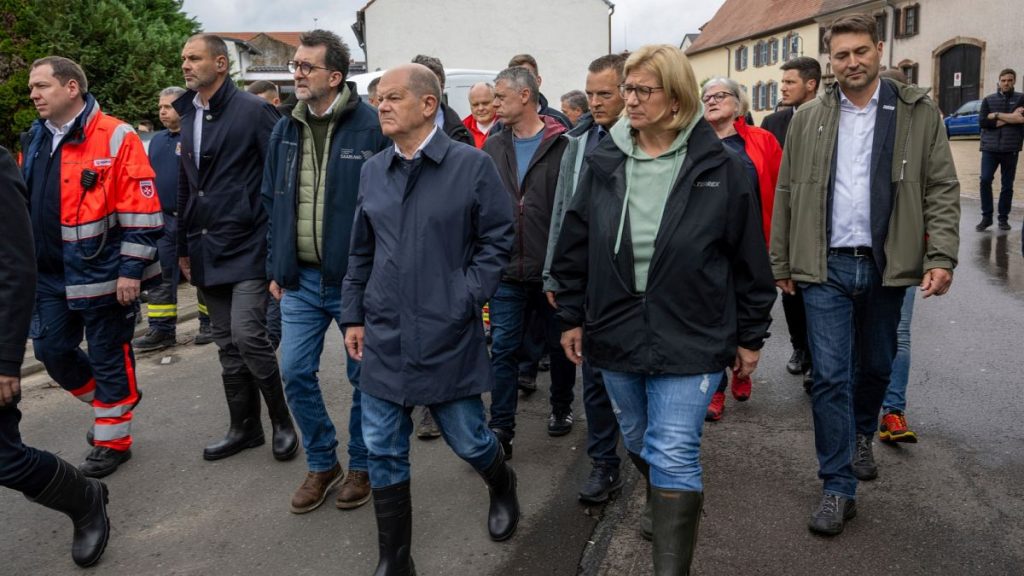German Chancellor Olaf Scholz recently visited flooded regions in the southwest of the country, where heavy rainfall has led to rivers bursting their banks, causing flash floods and landslides. Scholz cancelled his attendance at a European Parliament election campaign in Saarland to show solidarity with the residents of Kleinblittersdorf, who have been severely impacted by the floods. He walked through the village alongside regional governor Anke Rehlinger, speaking with local residents and emergency services personnel who have responded to thousands of requests for help. Several buildings had to be evacuated, and cars were partially submerged in the flooded streets. The city set up alternative accommodation in schools and established a hotline for those affected.
During his visit, Chancellor Scholz reassured the state of the federal government’s solidarity, stating that they would assess the situation and determine what needed to be done. Saarland has already taken initial steps to provide financial support for those affected by the floods. The German weather service has since lifted the weather alert for the country, as the rain is expected to ease slowly. Authorities in Saarland reported that flash flooding of this magnitude only occurs every 20 to 50 years, emphasizing the severity of the situation in the region.
As the cleanup and recovery efforts continue in the flooded areas of southwest Germany, Chancellor Scholz’s visit highlighted the importance of immediate support and solidarity for those affected by the natural disaster. The devastation caused by the flash floods and landslides has resulted in evacuations, flooded homes and businesses, and significant damage to infrastructure. The city of Kleinblittersdorf, in particular, is facing challenges in providing adequate shelter and assistance for residents who have been displaced by the floods. The federal government’s pledge of solidarity and financial support will be crucial in helping the affected communities rebuild and recover from this disaster.
The impact of the heavy rainfall and subsequent flooding in southwest Germany has led to a show of unity and resilience among residents, emergency services personnel, and government officials. Chancellor Scholz’s decision to prioritize his visit to the flooded regions over a political campaign event demonstrates the gravity of the situation and the need for immediate action to address the aftermath of the natural disaster. Saarland authorities have already taken steps to address the immediate needs of those affected by the floods, and further measures will be implemented to support the affected communities in the days and weeks ahead. The coordination between local, regional, and federal government agencies is crucial in providing effective assistance and resources for the recovery efforts.
The floods in southwest Germany serve as a stark reminder of the increasing frequency and intensity of extreme weather events due to climate change. As the world grapples with the devastating consequences of global warming, it is essential for governments and communities to prioritize climate resilience and adaptation measures to mitigate the impact of natural disasters. The recent floods in Saarland and other parts of Europe underscore the urgent need for proactive strategies to address the challenges posed by extreme weather events and protect vulnerable populations. By investing in sustainable infrastructure, disaster preparedness, and climate mitigation efforts, countries can build more resilient communities and reduce the risk of future disasters.
In the aftermath of the floods in southwest Germany, the focus is on providing immediate relief and support to the affected communities, as well as implementing long-term solutions to prevent similar events in the future. The solidarity shown by Chancellor Scholz and government officials is a testament to the importance of community support and collaboration in times of crisis. By working together to address the impacts of climate change and natural disasters, we can build a more resilient and sustainable future for all. The floods in southwest Germany serve as a call to action for governments, organizations, and individuals to prioritize climate resilience and adaptation efforts to protect our communities and environment for generations to come.













